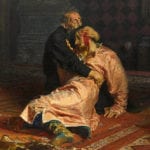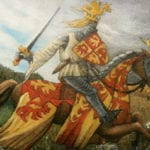 Weird Stuff
Weird Stuff  Weird Stuff
Weird Stuff  Mysteries
Mysteries 10 Tragic Disappearances and Deaths in Joshua Tree National Park
 History
History 10 Ways Childhood Really Sucked in the Old West
 Music
Music 10 Name Origins of Famous Bands from the 1990s
 Religion
Religion 10 Biggest Turnarounds by the Catholic Church
 Weird Stuff
Weird Stuff 10 Unbelievable Times Laws Had Unintended Consequences
 Humans
Humans Ten Historic Women Who Deserve Way More Credit Than They Got
 Movies and TV
Movies and TV 10 Films That Spawned Major Lawsuits
 History
History Ten Times Towns Were Wiped Off the Face of the Earth
 Creepy
Creepy 10 of the Most Disturbingly Haunted Public Houses in the UK
 Weird Stuff
Weird Stuff 10 Niche Subcultures That Are More Popular Than You Might Think
 Mysteries
Mysteries 10 Tragic Disappearances and Deaths in Joshua Tree National Park
 History
History 10 Ways Childhood Really Sucked in the Old West
Who's Behind Listverse?

Jamie Frater
Head Editor
Jamie founded Listverse due to an insatiable desire to share fascinating, obscure, and bizarre facts. He has been a guest speaker on numerous national radio and television stations and is a five time published author.
More About Us Music
Music 10 Name Origins of Famous Bands from the 1990s
 Religion
Religion 10 Biggest Turnarounds by the Catholic Church
 Weird Stuff
Weird Stuff 10 Unbelievable Times Laws Had Unintended Consequences
 Humans
Humans Ten Historic Women Who Deserve Way More Credit Than They Got
 Movies and TV
Movies and TV 10 Films That Spawned Major Lawsuits
 History
History Ten Times Towns Were Wiped Off the Face of the Earth
 Creepy
Creepy 10 of the Most Disturbingly Haunted Public Houses in the UK
10 Great Film Scores Snubbed By the Oscars
The Academy of Motion Picture Arts and Sciences often doesn’t seem to understand what makes music great or what great film music is. Here are 10 unsung heroes of the film score world, all of which failed to receive nominations for the listed entries.
Ted Turner’s labor of love bombed at the box office, probably because no one likes him, but the film is actually very good and very accurate. Edelman’s score is, by far, the greatest thing about it. They toned down the violence but still show tons of people getting blown up and shot down. The real theme of the film is intended to be the glory of the Union holding off the Confederacy, and the gentlemanly manner in which the sides fought (not true).
Aside from the single worst Southern accent in cinematic history courtesy of Martin Sheen as Robert E. Lee (this lister is Southern and knows what he’s talking about), the film’s got a bucket-load of infantry charges, men against men, men against cannon, men against horses, horses against cannon, and all are glorified in Edelman’s majestic music. The sounds of tragedy aren’t really heard until Pickett’s Charge, an extended centerpiece of Rebels getting cut down and obliterated with every cut of the camera. Edelman’s score is filled with long, sweeping lyrical melodies, a comparative rarity in film.
The part of this score everyone remembers is the shrieking violins in the shower scene, and that might lead some to say the score didn’t deserve an Oscar nod, but the rest of the score is equally creepy, suspenseful, and just right for one of Hitchcock’s finest achievements. The main theme is not for the lead character, played by Janet Leigh, but for the crime she’s committing: larceny. She steals a wad of cash from her boss and takes to the road.
So unlike the demure law-abiding lady she appears to be, beneath it all we all have criminal tendencies, especially when gazing at cash. Herrmann’s music captures this, as well as Leigh’s growing dread that she’s about to be caught. Actually, no character in this film has his or her own theme, except perhaps if the shrieking violins are taken as the mental state of Perkins’ Norman Bates.
You might not remember the score, only Kong fighting the biplanes atop the Empire State Building, but that’s because Steiner was a master at doing just what film scores were always intended to do: blend in with the film and enhance the drama. Steiner studied music in Vienna with Johannes Brahms and Gustav Mahler. So when he came to Hollywood, he had more than sufficient education to get the job done. His most famous score is Gone With the Wind (which should have beaten that of The Wizard of Oz).
Steiner, today, is nicknamed “the father of film music,” as one of the first to write primarily for films, but really, Richard Wagner deserves that epithet more. You can set many films to Wagner’s music, and actually improve them over the original scores. Steiner continued the Wagnerian tradition through Mahler.
As such, his score for Kong is classic in every way, and even today, when giant monster movies are made, the scores always pay homage to Steiner’s themes: the terrifying, bombastic bass theme for the monster; the lush, sultry baritone brass and strings for the jungle scenes; and of course, an overriding drive of tympani for the island natives. It’s possible that Hollywood simply didn’t know what to do with this, the first film of its kind. They didn’t have a category for special effects back then, and it failed to receive a single nomination for anything at all.
One of the greatest – and least known in the West – films ever made. Sergei Eisenstein’s two-part epic about one of the vilest rulers is fairly middle-of-the-road in terms of judgment for and against Ivan, but does not shy away from what happened. Every scene is mesmerizing. Add to this some of the finest music in all of film, from one of history’s greatest composers, and you’re in for some powerful drama.
Prokofiev’s music is some of his best work, so good in fact, that after his death in 1953, his music was rearranged into an oratorio, and then in to concert incidental music. Prokofiev scored both parts, and they are Opus 116 of his canon. Whereas, most film scores showcase three of four themes at most, and simply orchestrate these differently to suit various scenes, this is scarcely the style of a classically trained composer. His score for Ivan is perhaps the closest movies have ever gotten to genuine opera (along with John Williams’ E.T. The Extraterrestrial).
That’s right, everyone’s favorite whistling tune didn’t even get a nod. Neither did any other aspect of the film. It’s the quintessential quick-draw, stare-down music, parodied in hundreds of films after it. Morricone got the two-note motif in his head when he heard a coyote make the same sound on location in Spain. He thought it sounded as barren as the desert. Leone decided to use this idea: in the very first scene of the film after the credits, there is windy silence, and then a coyote bays the theme.
Then there’s the whirling Ecstasy of Gold near the end, when Eli Wallach, the ugly, is frantically searching for Arch Stanton’s grave, in which $200,000 in gold are waiting. Wallach, as Tuco, knows that Eastwood’s Man with No Name is hot on his trail, having just shot a cannon at him, and runs around the cemetery, reading the gravestones while the music whirls and rises euphorically, faster and faster to keep pace with him.
And who can forget the classic Mexican standoff – the one according to which all others are judged? It’s maybe the greatest Western ever made. Quentin Tarantino thinks so. When Lee Van Cleef joins the pair, Eastwood reveals that Stanton’s is the wrong grave, so they have to have a three-way shootout. The survivor gets the gold. While they stand still, famously glaring at one another, the music becomes unbearably intense, and that’s precisely what a film score was always supposed to do: enhance the drama in question. Who’s going to shoot whom? No one can be sure. That’s what the Mariachi-style music expresses, complete with Mexican guitar and gunfire.
One of the most exciting action epics ever, still able to hold its own against today’s modern, computer-enhanced masterpieces, and Bernstein’s score does it justice in every way. A strong, heroic march complete with snare drums to start things off, followed by some halfway playful determination that magnificently captures the Allied POWs devil-may-care attitude about escaping. The opening march instills an abiding sense of dread behind the story.
The point throughout the film is that they are not escaping for their freedom, but rather to cause the Nazis as many headaches as they can, hindering the Wehrmacht however possible: this true story is quite accurate, and based on the escape of 76 POWs from Stalag Luft III, in the Middle of Absolutely Nowhere, Germany. Many of these men attempted to escape from every prison they were sent to, up to 20 times for some, and the prisons treated them rather well as soldiers (compared to the Jews at other camps). Nevertheless, they considered their attempts to escape a matter of duty, and Bernstein’s score reflects this.
One of the very finest Western scores ever composed. It’s light, almost humorous, and rustic, with the main theme announced by an easy, solo clarinet. The bass line is a bouncy, horse-clopping tuba, almost like a slow march, and then the banjo plucks in. It’s such a perfect Western score that it could be used for any Western there is. Star Tom Selleck is 6’4″, just like John Wayne, so that tuba in the bass suits them both. The banjo would work great in any Jimmy Stewart picture, who sounds a little like a banjo.
The music for the villains is simple strings in unison, rising, pure intensity, that can be punctuated just right by that massive Quigley rifle. This film deserves better than its critics gave it. Some of them said it was sorely missing John Wayne, but this lister frankly thinks Wayne ruins most of the films he’s in. At least Selleck doesn’t know everything or walk with a borderline zombie swagger. And because the critics were unmerciful on it, everyone seems to have forgotten Poledouris’s music. He nailed everything, and of special importance are the Aborigines, who are the only real reminder that this Western doesn’t take place in the West, but in the Australian outback. Poledouris uses flutes to give them an ethereal, spirit-of-nature simplicity.
The most Wagnerian of this list’s entries. Film composers will always be quick to tell you how indebted their colleagues are to Richard Wagner, who pushed the theory of leitmotifs to its pinnacle. Every character, every emotion, setting, even weapon, gets its own little melody, themes that can be spliced together in all sorts of combinations to express what goes on on stage or screen.
Bernstein stuck to the classic ideals everyone seems to have about God and Moses and biblical scenes. God’s theme is powerful, bass, a little frightening or at least respectable. Heston, as Moses, gets the hero’s theme, and then, of course, there is the driving, frantic music for the Israelites’ flight before Pharaoh Yul Brynner’s army. Not only should this film have flat out won the Best Picture Oscar, the only Oscar it won was for special effects, and that was just for the Red Sea Crossing. All the music has a decidedly Jewish flair about it. Bernstein pulled out all the stops, using the whole brass section as the Red Sea closes on the Egyptian army.
Horner actually composed the original version of this score for Star Trek II: the Wrath of Khan, and when he finished it, he was offered the scoring of Krull, with a promised release date of spring 1983, in time with Return of the Jedi. But post-production of Krull stretched into development hell, and Horner did not get a rough cut of the film to work with until there were only 7 weeks left before its release on July 29.
Not one to turn down a pay check early in his career, he simply reworked his Star Trek score to fit the rough cut, which in various places was especially easy given the screen depictions of outer space, with Freddie Jones’ weighty narration, “…and their son shall rule the galaxy.” The score is incredibly exhilarating. The driving dactylic beat gives you no choice but to think of a hero riding a galloping horse, which is how the main character makes his entrance. Cue the French horns. Music appreciation 101: French horns always equal the hero. The villain has to make do with the lowest instruments. For seven weeks worth of labor, this one is astounding. And it’s the only part of the film anyone really remembers anymore. The story is obviously meant for the younger crowd. Don’t look for the potholes or you’ll find them.
One of the most unfairly under-appreciated films ever made. It’s not Casablanca, but it’s entertaining. The sword fights aren’t as brilliantly choreographed as those of The Mark of Zorro, The Last Samurai, or The Lord of the Rings, but somehow, they work better in their own way. They’re incredibly brutal, and all power, with little finesse, as they should be given the gigantic size of the actors. When Arnold slashes someone across the gut, blood goes everywhere. He cuts James Earl Jones’ head off with two hacks, not just a clean slice. It’s raw, gory, and still original.
Thus, it needed equally full-force music, and got everything just right from Poledouris. One of the most vibrant, fearless, unflinching fantasy scores ever. The famous horseback charge against the good guys near the end is accompanied by music just as powerful as that of Howard Shore in the Lord of the Rings. It takes the swords and sorcery seriously.
Sidenote: If ever there were a film in which an actor managed to look the part of a comic book character with over-the-top muscles, this is it. Schwarzenegger decided to get in shape for the film by training for yet another Mr. Olympia competition, this one in 1980, which he won, and took a few months off training to be in the film, which explains his freakishly superhuman physique.








